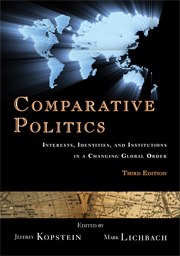Book contents
- Frontmatter
- Contents
- List of Maps
- Preface to the Third Edition
- List of Contributors
- 1 What Is Comparative Politics?
- 2 The Framework of Analysis
- PART ONE EARLY DEVELOPERS
- PART TWO MIDDLE DEVELOPERS
- PART THREE LATE DEVELOPERS
- PART FOUR EXPERIMENTAL DEVELOPERS
- 9 Mexico
- 10 India
- 11 Iran
- 12 South Africa
- 13 The European Union
- 14 Nigeria
- STOP AND COMPARE
- Index
- References
14 - Nigeria
from PART FOUR - EXPERIMENTAL DEVELOPERS
- Frontmatter
- Contents
- List of Maps
- Preface to the Third Edition
- List of Contributors
- 1 What Is Comparative Politics?
- 2 The Framework of Analysis
- PART ONE EARLY DEVELOPERS
- PART TWO MIDDLE DEVELOPERS
- PART THREE LATE DEVELOPERS
- PART FOUR EXPERIMENTAL DEVELOPERS
- 9 Mexico
- 10 India
- 11 Iran
- 12 South Africa
- 13 The European Union
- 14 Nigeria
- STOP AND COMPARE
- Index
- References
Summary
Introduction
Three mutually reinforcing sets of factors have played a central role in shaping Nigeria's political development from the precolonial through the colonial to the postcolonial era. These are the material interests and competing identities of its roughly 150 million peoples and 250 ethnic groups mediated by the type of institutions (that is, those long-term, authoritative rules and procedures that structure how power flows) created by the people and those who have exercised political authority over this territory. These material interests, identities, and institutions have in turn been shaped by the international environment in which Nigerians in each of these periods in their history interacted among themselves and with the outside world. What makes Nigerian politics interesting also is the constant proliferation of these material interests and identities – often arising from both domestic and global pressures – and the myriad ways in which they have either been accommodated or rejected by the given political order, as well as the extent to which these dynamic interactions have enhanced or undermined the existing order.
The combination of these four variables provides a robust framework for analyzing the general family of events that have shaped the political life of this fascinating country. The first set of these events falls within the historical and social origins of the entity that make up Nigeria today.
- Type
- Chapter
- Information
- Comparative PoliticsInterests, Identities, and Institutions in a Changing Global Order, pp. 534 - 588Publisher: Cambridge University PressPrint publication year: 2008



